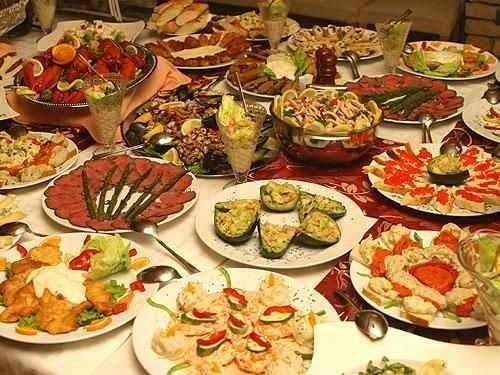Introduction: Bosnian Cuisine Overview
Bosnian cuisine is a unique blend of Ottoman, Austro-Hungarian, and Mediterranean influences. It is characterized by a diverse range of dishes that vary from region to region. Bosnian cuisine is known for its rich flavors, hearty portions, and use of fresh, seasonal ingredients. It is a reflection of the country’s history and cultural diversity.
Bosnian cuisine is centered around meat and vegetables, with an emphasis on slow-cooking and hearty stews. The cuisine is also known for its use of spices, such as paprika and cumin, which add depth and complexity to dishes. Bosnian cuisine is a fusion of different culinary traditions, resulting in a unique and delicious cuisine that is worth exploring.
Key Ingredients Used in Bosnian Cooking
Bosnian cuisine relies heavily on seasonal ingredients, such as fruits, vegetables, and herbs. Some of the key ingredients used in Bosnian cooking include lamb, beef, chicken, potatoes, onions, tomatoes, peppers, eggplants, and spinach. Bosnian cuisine is also known for its use of dairy products, such as cheese and yogurt.
Bosnian cuisine is characterized by its use of spices, such as paprika, cumin, and garlic. These spices are often used to flavor meat dishes, while herbs like parsley and dill are used to add freshness and brightness to salads and vegetable dishes. Bosnian cuisine also includes a variety of bread, such as pita, which is often served with meals.
Traditional Dishes and Specialties
Bosnian cuisine is known for its traditional stews, such as Bosanski Lonac, which is a meat and vegetable stew that is slow-cooked in a clay pot. Ćevapi, a grilled minced meat dish, is another popular dish in Bosnian cuisine. Another popular dish is burek, a savory pastry filled with cheese, meat, or vegetables. Sarma is a cabbage roll filled with meat and rice, while dolma is a stuffed pepper or eggplant.
In addition to these traditional dishes, Bosnian cuisine also includes specialties such as klepe, small dumplings filled with meat and served with a yogurt and paprika-based sauce. Another specialty is ćufte, which are meatballs made with a mixture of beef and lamb and served with a tomato-based sauce.
Meat-Based Dishes in Bosnian Cuisine
Bosnian cuisine is known for its meat-based dishes, which are often slow-cooked and hearty. Some of the most popular meat-based dishes in Bosnian cuisine include ćevapi, a type of grilled minced meat, and Bosanski Lonac, a meat and vegetable stew. Another popular meat dish is suho meso, which is dried beef that is often served as a snack or appetizer.
Bosnian cuisine also includes a variety of grilled meats, such as lamb, chicken, and beef, which are often served with grilled vegetables and bread. Ćufte, or meatballs, are another popular meat-based dish, which are often served with a tomato-based sauce and mashed potatoes.
Vegetarian and Vegan Options
While Bosnian cuisine is known for its meat-based dishes, there are also plenty of vegetarian and vegan options available. Some of the most popular vegetarian and vegan dishes in Bosnian cuisine include grah, a bean stew that is often served with bread, and burek, a savory pastry that can be filled with cheese or vegetables.
Vegetable dishes, such as stuffed peppers and eggplants, are also popular in Bosnian cuisine. Salads, such as Šopska salad, which is made with tomatoes, cucumbers, onions, and cheese, are also a popular vegetarian option.
Sweet Treats and Desserts in Bosnian Cuisine
Bosnian cuisine is known for its sweet treats and desserts, which are often made with honey, nuts, and fruit. Baklava, a pastry made with layers of phyllo dough and filled with chopped nuts and honey, is a popular dessert in Bosnian cuisine. Tufahije, which are poached apples stuffed with walnuts and topped with whipped cream, are another popular dessert.
Other popular sweet treats in Bosnian cuisine include hurmašice, a type of cookie made with semolina flour and sweet syrup, and štrudla, a pastry filled with apples or cheese. Fruit compotes, made with a variety of seasonal fruits, are also a popular dessert in Bosnian cuisine.
Popular Beverages in Bosnian Culture
Bosnian cuisine is known for its strong coffee, which is often served with a cube of sugar and a glass of water. Turkish coffee, which is made by boiling finely ground coffee beans and water together, is a staple beverage in Bosnian culture. Bosnian cuisine also includes a variety of herbal teas, such as sage and chamomile, which are often served with honey.
Alcoholic beverages, such as rakija, a type of fruit brandy, and beer, are also popular in Bosnian culture. Wine is also produced in Bosnia and Herzegovina, particularly in the Herzegovina region.
Influences and Regional Variations in Bosnian Cuisine
Bosnian cuisine is a reflection of the country’s history and cultural diversity, with influences from Ottoman, Austro-Hungarian, and Mediterranean culinary traditions. The cuisine also varies regionally, with different regions having their own specialties and local ingredients.
In the Herzegovina region, for example, Italian and Mediterranean influences are more prevalent, while in the north of the country, Austro-Hungarian influences are more prominent. The eastern part of Bosnia and Herzegovina, which borders Serbia, is known for its grilled meats and spicy dishes.
Overall, Bosnian cuisine is a vibrant and diverse cuisine that is a reflection of the country’s rich history and cultural heritage. It is a cuisine that is worth exploring for its unique flavors and delicious dishes.

